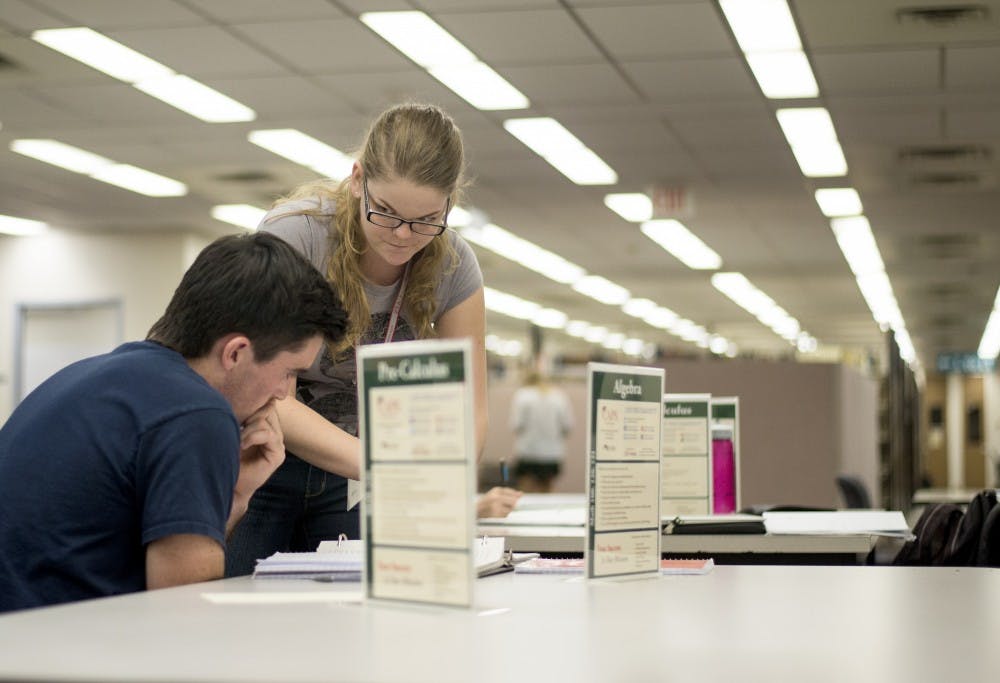UNM has merged the Center for Academic Program Support and the Center for Teaching Excellence to form the Center for Teaching Learning, with the mission of helping students succeed through new methods.
“Now we’re working together, because the bottom line is the exact same result: we want students to learn more,” said Aeron Haynie, CTL director. “We’ve got to teach faculty some things and we’ve got to empower students at the same time.”
Over the summer, Provost Chaouki Abdallah made the decision to combine the two University programs into a single entity, and assigned Haynie to lead it.
This means the two groups are combining resources, Haynie said, a decision made to further organize the efforts as one distinct branch. The new center will officially keep the name CAPS, primarily because of the recognition that goes along with it.
“A lot of undergraduate students know what that is, and it’s a really good program that’s won a national award,” Haynie said. “We don’t want to lose that identity, so the Center for Teaching and Learning is sort of an umbrella term.”
Haynie, previously the director of the CTE, moved her office to CAPS to be closer to the students and student employees, she said. Now, instead of just working with faculty, she has a lot more contact with undergraduate students.
Being based in the Zimmerman CAPS center has afforded Haynie and the CTL the opportunity to have “more student input in the teaching side, and vice versa.”
“We have now a group of students who are always here, that we can ask when we have important decisions, when we need input from a student point of view,” Haynie said. “I think you can sort of see how the student center and the faculty center can kind of share a lot of information and expertise.”
She said the project has also made several new additions and offerings since it’s formation in July, including a collaboration with graduate studies to present a graduate teaching academy certificate for teaching assistants. She will be teaching the one-credit course this semester.
“Our argument is that we should try to support all those people. They really want to teach well. It’s hard to juggle all of those things,” she said. “Help graduate students get jobs and it should improve the quality of undergraduate teaching by graduate students.”
The center also has a two-day course in January and May designed to help faculty plan their syllabuses, she said. In addition, optional workshops and lectures on teaching, open to all UNM faculty, are offered one to four times each month.
Melissa Francis, a graduate student and departmental instructor for the Communication and Journalism Department, said there is a lot of benefit in taking those kinds of courses.
Get content from The Daily Lobo delivered to your inbox
“As a new grad student and instructor, I find that these workshops can help me find new teaching methods that I may have never considered before,” Francis said.
She attended Tema Milstein’s workshop, titled “Turn the Classroom Inside-Out”, which taught her, among other things, the benefit of free writing.
“It’s a new activity that I can do with my students, but also a way to break down the classroom walls to enhance learning,” she said.
It was a beneficial experience, Francis said, adding that she plans to attend future workshops and learn more to help her find her flow as a new teacher.
“Sometimes that understanding of improvement and change isn’t realized during school, so it’s beneficial to use this method to embrace success,” she said.
Haynie said the workshops, which are held in the old CTE location at the University Advisement and Enrichment Center, are also important to established teachers.
“There are so many faculty here who, even though they’re dedicated to research and they get grants and they write books, they really care about teaching,” she said. “Often, it’s the really good ones that come to the workshops and come to the lectures.”
The center has many other services always available to faculty, she said, including confidential consultation, classroom observation and mid-semester feedback, all by request.
Haynie said she believes that the bottom line is and always should be the students.
“In consolidating, we are stronger and I think we do have more visibility. So we can bring the focus of student learning up at every meeting we’re at,” she said. “You go into the classroom and you teach students, that’s the bottom line. Without the students we would not be a university.”
Matthew Reisen is a senior reporter for the Daily Lobo. He can be reached at news@dailylobo.com or on Twitter @DailyLobo.






